Political Affiliation: Identifying Party Preferences and Candidates
VerifiedAdded on 2022/08/12
|6
|1291
|22
Essay
AI Summary
This essay delves into the student's political affiliation, exploring their alignment with the Democratic party based on a political quiz. The student's analysis highlights their preference for progressive values and their agreement with the Democrats' stance on contemporary issues like welfare, environmental conservation, and social justice. The essay discusses the influence of values in shaping political interests and the student's support for candidates such as Pete Buttigieg, while also acknowledging the appeal of Elizabeth Warren. The student references sociological concepts like Max Weber's types of power and government legitimacy to frame their political views, ultimately explaining their political preferences and the rationale behind them. The essay also includes references to other political figures such as Tom Steyer, Bernie Sanders and Michael Bloomberg. The paper concludes with an analysis of the student's political stance on key issues such as student debt cancellation, environmental protection, state-funded education, and healthcare.
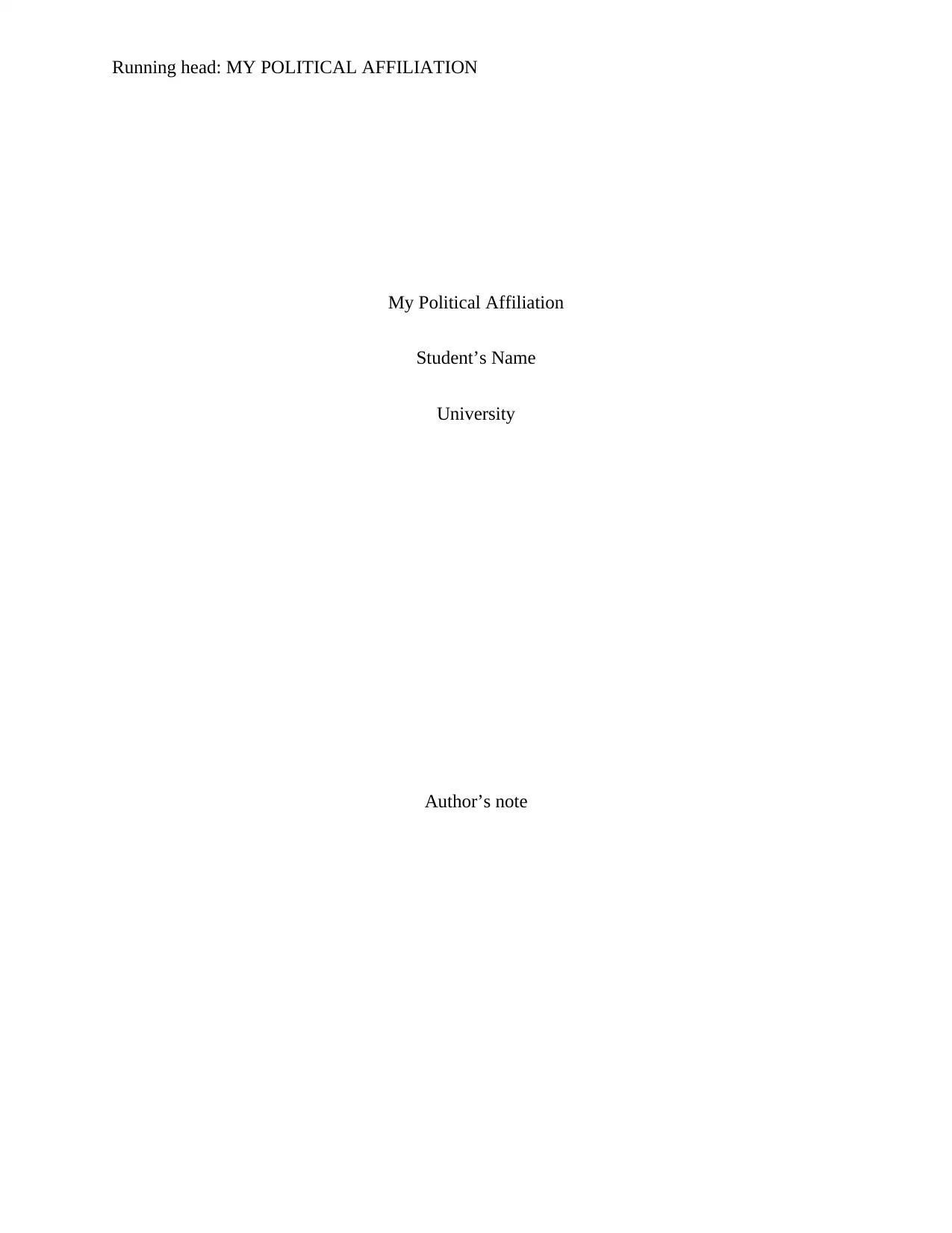
Running head: MY POLITICAL AFFILIATION
My Political Affiliation
Student’s Name
University
Author’s note
My Political Affiliation
Student’s Name
University
Author’s note
Paraphrase This Document
Need a fresh take? Get an instant paraphrase of this document with our AI Paraphraser
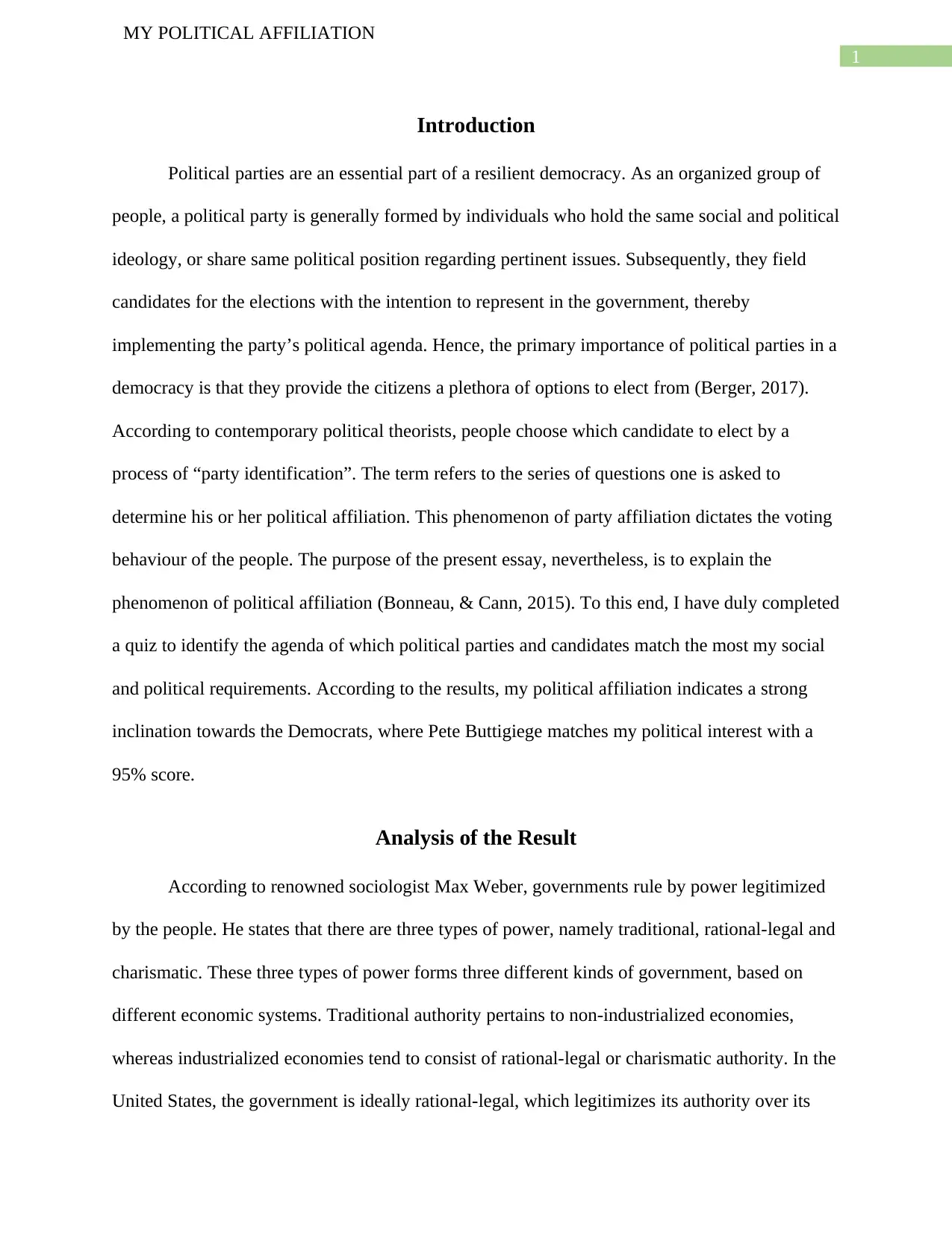
1
MY POLITICAL AFFILIATION
Introduction
Political parties are an essential part of a resilient democracy. As an organized group of
people, a political party is generally formed by individuals who hold the same social and political
ideology, or share same political position regarding pertinent issues. Subsequently, they field
candidates for the elections with the intention to represent in the government, thereby
implementing the party’s political agenda. Hence, the primary importance of political parties in a
democracy is that they provide the citizens a plethora of options to elect from (Berger, 2017).
According to contemporary political theorists, people choose which candidate to elect by a
process of “party identification”. The term refers to the series of questions one is asked to
determine his or her political affiliation. This phenomenon of party affiliation dictates the voting
behaviour of the people. The purpose of the present essay, nevertheless, is to explain the
phenomenon of political affiliation (Bonneau, & Cann, 2015). To this end, I have duly completed
a quiz to identify the agenda of which political parties and candidates match the most my social
and political requirements. According to the results, my political affiliation indicates a strong
inclination towards the Democrats, where Pete Buttigiege matches my political interest with a
95% score.
Analysis of the Result
According to renowned sociologist Max Weber, governments rule by power legitimized
by the people. He states that there are three types of power, namely traditional, rational-legal and
charismatic. These three types of power forms three different kinds of government, based on
different economic systems. Traditional authority pertains to non-industrialized economies,
whereas industrialized economies tend to consist of rational-legal or charismatic authority. In the
United States, the government is ideally rational-legal, which legitimizes its authority over its
MY POLITICAL AFFILIATION
Introduction
Political parties are an essential part of a resilient democracy. As an organized group of
people, a political party is generally formed by individuals who hold the same social and political
ideology, or share same political position regarding pertinent issues. Subsequently, they field
candidates for the elections with the intention to represent in the government, thereby
implementing the party’s political agenda. Hence, the primary importance of political parties in a
democracy is that they provide the citizens a plethora of options to elect from (Berger, 2017).
According to contemporary political theorists, people choose which candidate to elect by a
process of “party identification”. The term refers to the series of questions one is asked to
determine his or her political affiliation. This phenomenon of party affiliation dictates the voting
behaviour of the people. The purpose of the present essay, nevertheless, is to explain the
phenomenon of political affiliation (Bonneau, & Cann, 2015). To this end, I have duly completed
a quiz to identify the agenda of which political parties and candidates match the most my social
and political requirements. According to the results, my political affiliation indicates a strong
inclination towards the Democrats, where Pete Buttigiege matches my political interest with a
95% score.
Analysis of the Result
According to renowned sociologist Max Weber, governments rule by power legitimized
by the people. He states that there are three types of power, namely traditional, rational-legal and
charismatic. These three types of power forms three different kinds of government, based on
different economic systems. Traditional authority pertains to non-industrialized economies,
whereas industrialized economies tend to consist of rational-legal or charismatic authority. In the
United States, the government is ideally rational-legal, which legitimizes its authority over its
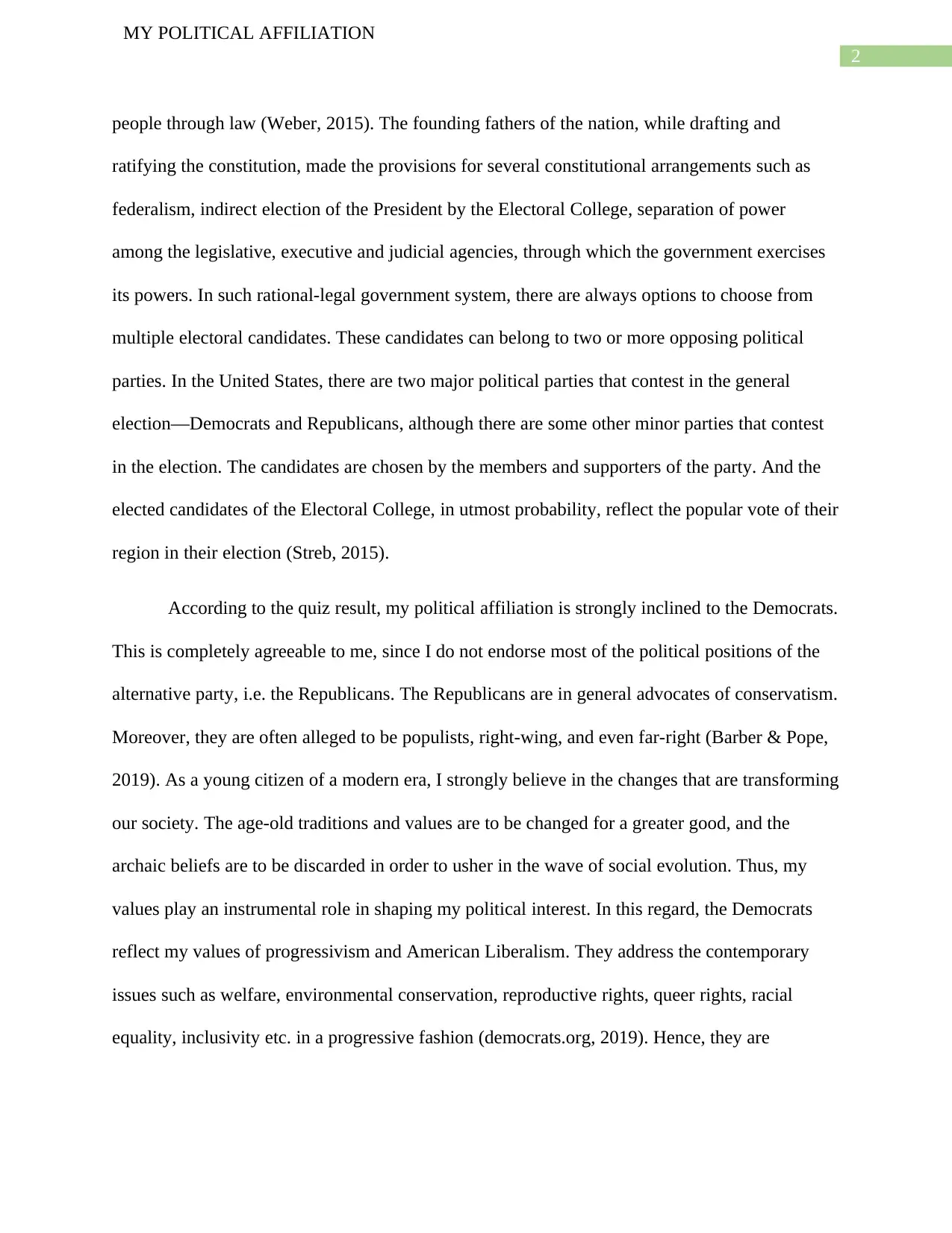
2
MY POLITICAL AFFILIATION
people through law (Weber, 2015). The founding fathers of the nation, while drafting and
ratifying the constitution, made the provisions for several constitutional arrangements such as
federalism, indirect election of the President by the Electoral College, separation of power
among the legislative, executive and judicial agencies, through which the government exercises
its powers. In such rational-legal government system, there are always options to choose from
multiple electoral candidates. These candidates can belong to two or more opposing political
parties. In the United States, there are two major political parties that contest in the general
election—Democrats and Republicans, although there are some other minor parties that contest
in the election. The candidates are chosen by the members and supporters of the party. And the
elected candidates of the Electoral College, in utmost probability, reflect the popular vote of their
region in their election (Streb, 2015).
According to the quiz result, my political affiliation is strongly inclined to the Democrats.
This is completely agreeable to me, since I do not endorse most of the political positions of the
alternative party, i.e. the Republicans. The Republicans are in general advocates of conservatism.
Moreover, they are often alleged to be populists, right-wing, and even far-right (Barber & Pope,
2019). As a young citizen of a modern era, I strongly believe in the changes that are transforming
our society. The age-old traditions and values are to be changed for a greater good, and the
archaic beliefs are to be discarded in order to usher in the wave of social evolution. Thus, my
values play an instrumental role in shaping my political interest. In this regard, the Democrats
reflect my values of progressivism and American Liberalism. They address the contemporary
issues such as welfare, environmental conservation, reproductive rights, queer rights, racial
equality, inclusivity etc. in a progressive fashion (democrats.org, 2019). Hence, they are
MY POLITICAL AFFILIATION
people through law (Weber, 2015). The founding fathers of the nation, while drafting and
ratifying the constitution, made the provisions for several constitutional arrangements such as
federalism, indirect election of the President by the Electoral College, separation of power
among the legislative, executive and judicial agencies, through which the government exercises
its powers. In such rational-legal government system, there are always options to choose from
multiple electoral candidates. These candidates can belong to two or more opposing political
parties. In the United States, there are two major political parties that contest in the general
election—Democrats and Republicans, although there are some other minor parties that contest
in the election. The candidates are chosen by the members and supporters of the party. And the
elected candidates of the Electoral College, in utmost probability, reflect the popular vote of their
region in their election (Streb, 2015).
According to the quiz result, my political affiliation is strongly inclined to the Democrats.
This is completely agreeable to me, since I do not endorse most of the political positions of the
alternative party, i.e. the Republicans. The Republicans are in general advocates of conservatism.
Moreover, they are often alleged to be populists, right-wing, and even far-right (Barber & Pope,
2019). As a young citizen of a modern era, I strongly believe in the changes that are transforming
our society. The age-old traditions and values are to be changed for a greater good, and the
archaic beliefs are to be discarded in order to usher in the wave of social evolution. Thus, my
values play an instrumental role in shaping my political interest. In this regard, the Democrats
reflect my values of progressivism and American Liberalism. They address the contemporary
issues such as welfare, environmental conservation, reproductive rights, queer rights, racial
equality, inclusivity etc. in a progressive fashion (democrats.org, 2019). Hence, they are
⊘ This is a preview!⊘
Do you want full access?
Subscribe today to unlock all pages.

Trusted by 1+ million students worldwide
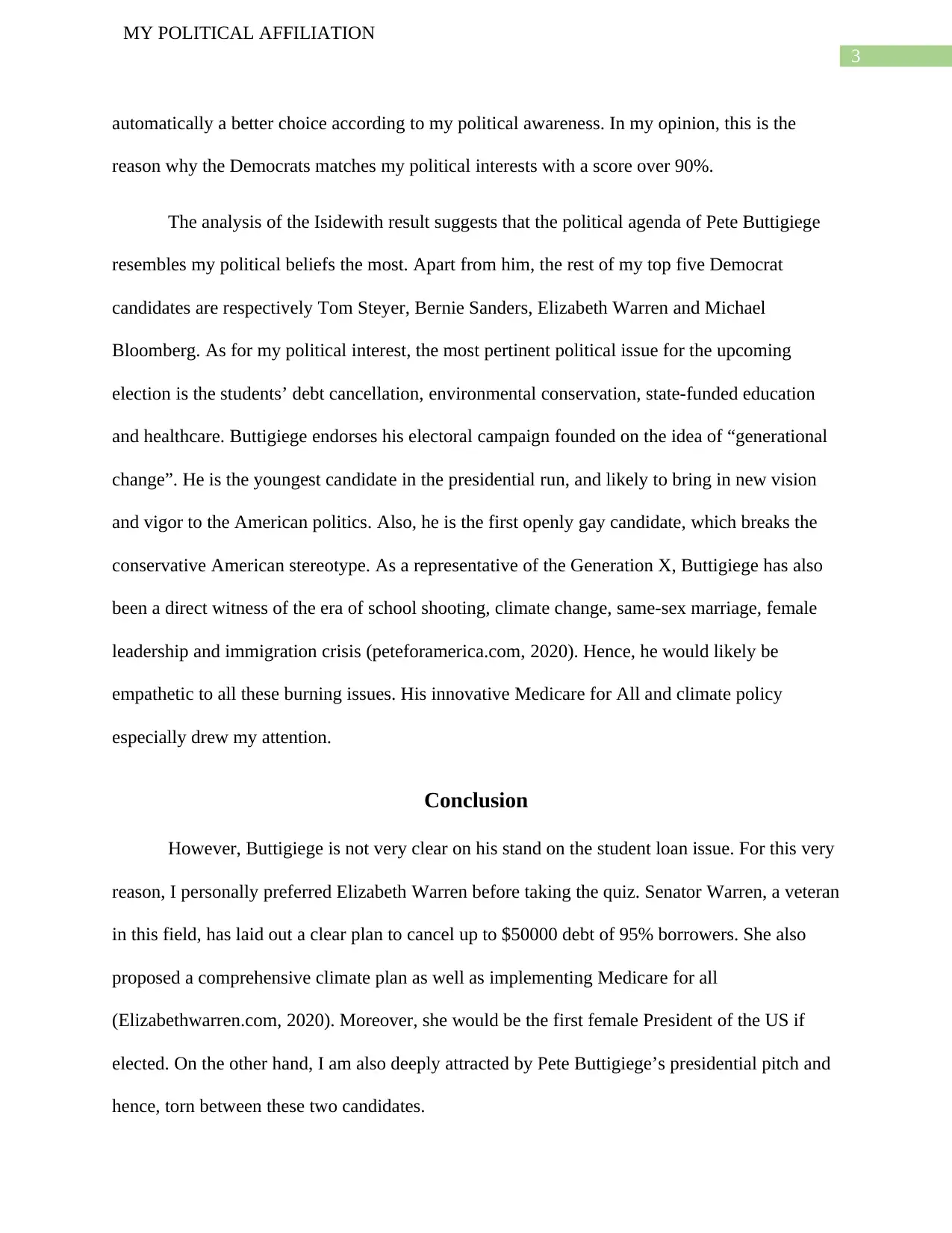
3
MY POLITICAL AFFILIATION
automatically a better choice according to my political awareness. In my opinion, this is the
reason why the Democrats matches my political interests with a score over 90%.
The analysis of the Isidewith result suggests that the political agenda of Pete Buttigiege
resembles my political beliefs the most. Apart from him, the rest of my top five Democrat
candidates are respectively Tom Steyer, Bernie Sanders, Elizabeth Warren and Michael
Bloomberg. As for my political interest, the most pertinent political issue for the upcoming
election is the students’ debt cancellation, environmental conservation, state-funded education
and healthcare. Buttigiege endorses his electoral campaign founded on the idea of “generational
change”. He is the youngest candidate in the presidential run, and likely to bring in new vision
and vigor to the American politics. Also, he is the first openly gay candidate, which breaks the
conservative American stereotype. As a representative of the Generation X, Buttigiege has also
been a direct witness of the era of school shooting, climate change, same-sex marriage, female
leadership and immigration crisis (peteforamerica.com, 2020). Hence, he would likely be
empathetic to all these burning issues. His innovative Medicare for All and climate policy
especially drew my attention.
Conclusion
However, Buttigiege is not very clear on his stand on the student loan issue. For this very
reason, I personally preferred Elizabeth Warren before taking the quiz. Senator Warren, a veteran
in this field, has laid out a clear plan to cancel up to $50000 debt of 95% borrowers. She also
proposed a comprehensive climate plan as well as implementing Medicare for all
(Elizabethwarren.com, 2020). Moreover, she would be the first female President of the US if
elected. On the other hand, I am also deeply attracted by Pete Buttigiege’s presidential pitch and
hence, torn between these two candidates.
MY POLITICAL AFFILIATION
automatically a better choice according to my political awareness. In my opinion, this is the
reason why the Democrats matches my political interests with a score over 90%.
The analysis of the Isidewith result suggests that the political agenda of Pete Buttigiege
resembles my political beliefs the most. Apart from him, the rest of my top five Democrat
candidates are respectively Tom Steyer, Bernie Sanders, Elizabeth Warren and Michael
Bloomberg. As for my political interest, the most pertinent political issue for the upcoming
election is the students’ debt cancellation, environmental conservation, state-funded education
and healthcare. Buttigiege endorses his electoral campaign founded on the idea of “generational
change”. He is the youngest candidate in the presidential run, and likely to bring in new vision
and vigor to the American politics. Also, he is the first openly gay candidate, which breaks the
conservative American stereotype. As a representative of the Generation X, Buttigiege has also
been a direct witness of the era of school shooting, climate change, same-sex marriage, female
leadership and immigration crisis (peteforamerica.com, 2020). Hence, he would likely be
empathetic to all these burning issues. His innovative Medicare for All and climate policy
especially drew my attention.
Conclusion
However, Buttigiege is not very clear on his stand on the student loan issue. For this very
reason, I personally preferred Elizabeth Warren before taking the quiz. Senator Warren, a veteran
in this field, has laid out a clear plan to cancel up to $50000 debt of 95% borrowers. She also
proposed a comprehensive climate plan as well as implementing Medicare for all
(Elizabethwarren.com, 2020). Moreover, she would be the first female President of the US if
elected. On the other hand, I am also deeply attracted by Pete Buttigiege’s presidential pitch and
hence, torn between these two candidates.
Paraphrase This Document
Need a fresh take? Get an instant paraphrase of this document with our AI Paraphraser
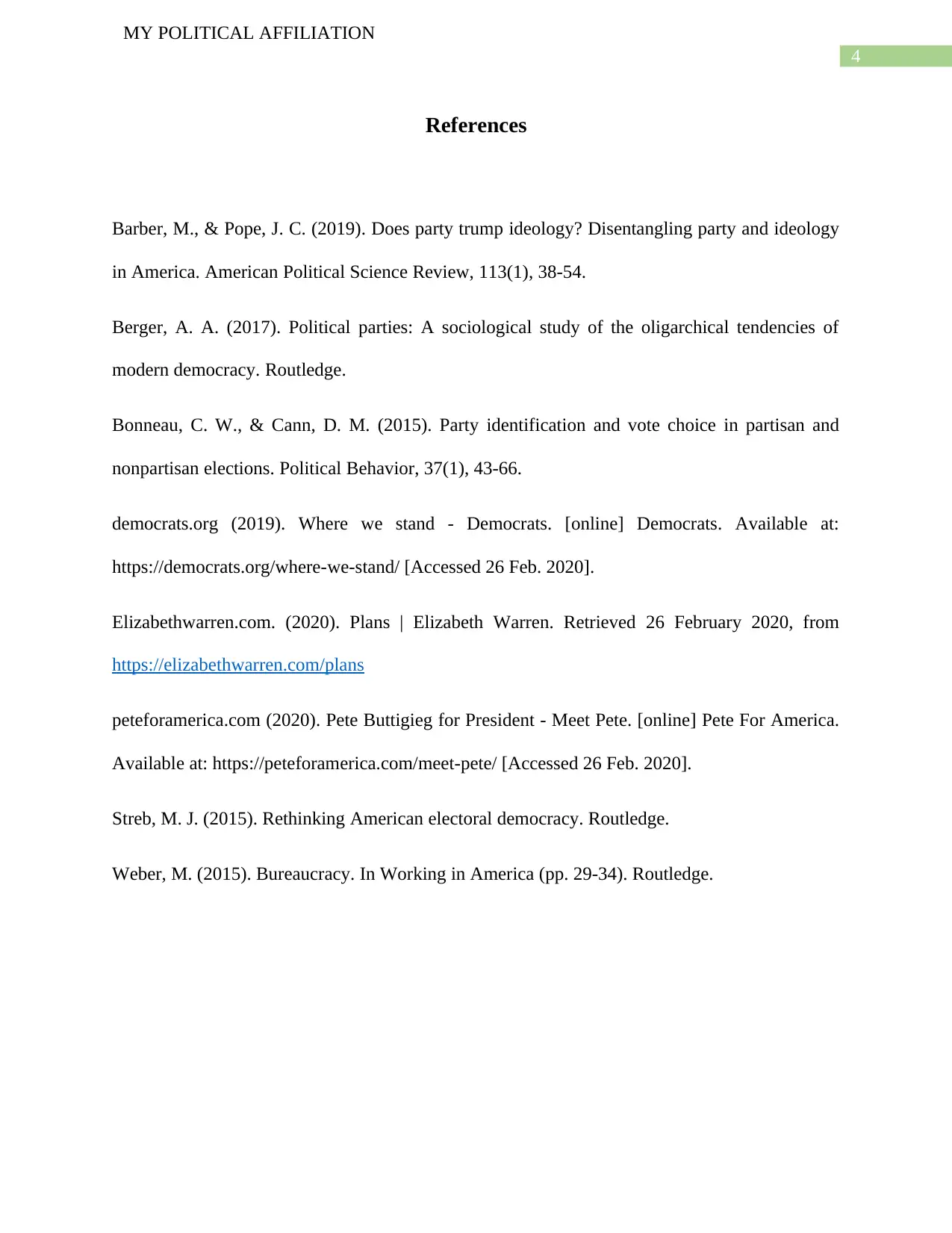
4
MY POLITICAL AFFILIATION
References
Barber, M., & Pope, J. C. (2019). Does party trump ideology? Disentangling party and ideology
in America. American Political Science Review, 113(1), 38-54.
Berger, A. A. (2017). Political parties: A sociological study of the oligarchical tendencies of
modern democracy. Routledge.
Bonneau, C. W., & Cann, D. M. (2015). Party identification and vote choice in partisan and
nonpartisan elections. Political Behavior, 37(1), 43-66.
democrats.org (2019). Where we stand - Democrats. [online] Democrats. Available at:
https://democrats.org/where-we-stand/ [Accessed 26 Feb. 2020].
Elizabethwarren.com. (2020). Plans | Elizabeth Warren. Retrieved 26 February 2020, from
https://elizabethwarren.com/plans
peteforamerica.com (2020). Pete Buttigieg for President - Meet Pete. [online] Pete For America.
Available at: https://peteforamerica.com/meet-pete/ [Accessed 26 Feb. 2020].
Streb, M. J. (2015). Rethinking American electoral democracy. Routledge.
Weber, M. (2015). Bureaucracy. In Working in America (pp. 29-34). Routledge.
MY POLITICAL AFFILIATION
References
Barber, M., & Pope, J. C. (2019). Does party trump ideology? Disentangling party and ideology
in America. American Political Science Review, 113(1), 38-54.
Berger, A. A. (2017). Political parties: A sociological study of the oligarchical tendencies of
modern democracy. Routledge.
Bonneau, C. W., & Cann, D. M. (2015). Party identification and vote choice in partisan and
nonpartisan elections. Political Behavior, 37(1), 43-66.
democrats.org (2019). Where we stand - Democrats. [online] Democrats. Available at:
https://democrats.org/where-we-stand/ [Accessed 26 Feb. 2020].
Elizabethwarren.com. (2020). Plans | Elizabeth Warren. Retrieved 26 February 2020, from
https://elizabethwarren.com/plans
peteforamerica.com (2020). Pete Buttigieg for President - Meet Pete. [online] Pete For America.
Available at: https://peteforamerica.com/meet-pete/ [Accessed 26 Feb. 2020].
Streb, M. J. (2015). Rethinking American electoral democracy. Routledge.
Weber, M. (2015). Bureaucracy. In Working in America (pp. 29-34). Routledge.
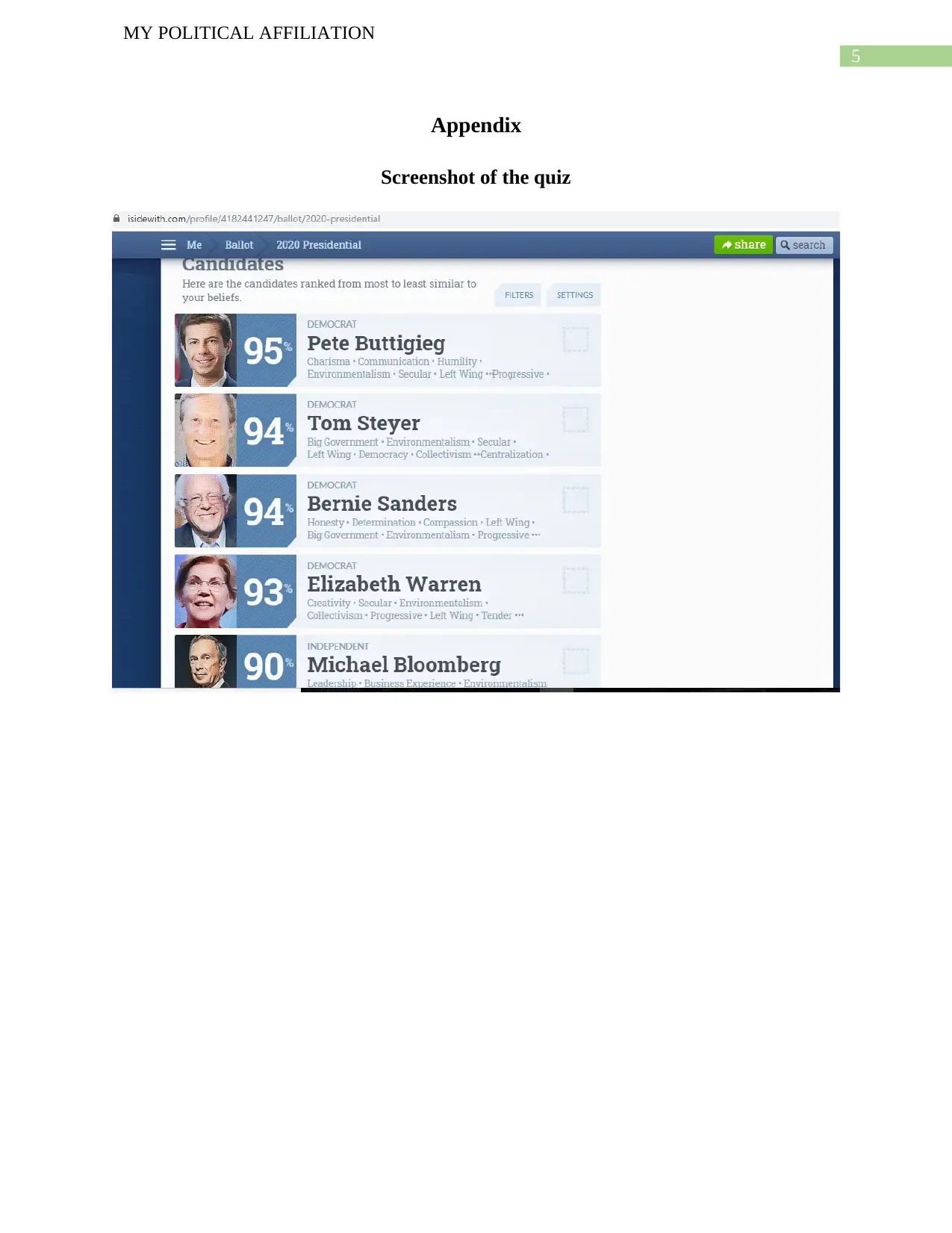
5
MY POLITICAL AFFILIATION
Appendix
Screenshot of the quiz
MY POLITICAL AFFILIATION
Appendix
Screenshot of the quiz
⊘ This is a preview!⊘
Do you want full access?
Subscribe today to unlock all pages.

Trusted by 1+ million students worldwide
1 out of 6
Related Documents
Your All-in-One AI-Powered Toolkit for Academic Success.
+13062052269
info@desklib.com
Available 24*7 on WhatsApp / Email
![[object Object]](/_next/static/media/star-bottom.7253800d.svg)
Unlock your academic potential
Copyright © 2020–2025 A2Z Services. All Rights Reserved. Developed and managed by ZUCOL.





